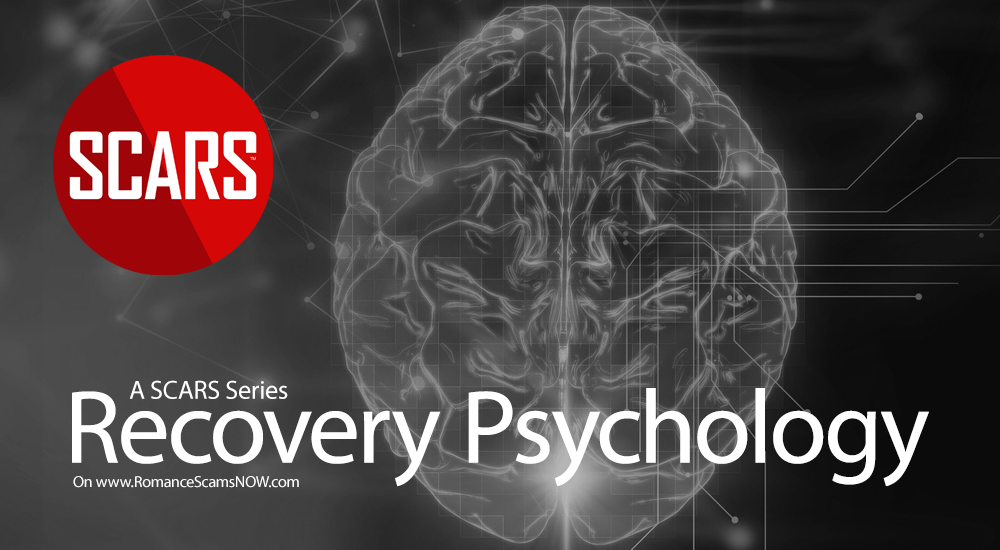
SCARS Institute’s Encyclopedia of Scams™ Published Continuously for 25 Years

After Scam Victims Have Experienced Trauma
It Is Important For Scam Victims To Limit Their Exposure To More Crime News & Criminal Photos For At Least The First 6 Months To A Year After Their Scam
This is a very serious recommendation for scam victims because scam victims can deepen their trauma by continued exposure to news and information about scammers – it can also manifest into hate!
This is especially true when scam victims are exposed to hate and aggression against scammers in the typical anti-scam hate groups, that do almost nothing but express their hatred by constantly exposing or shaming scammers on social media.
NOTE:
We are not talking about information that will help scam victims to better understand how these crimes work, or why they were targeted, such as the Psychology of Scams section here on this website. We are talking about news about scammers’ actions, arrests, etc. And most important limit their exposure to scammer photos.
Why This Matters For Scam Victims – And All Crime Victims!
Scam victims who have been traumatized by the crime they were a part of may experience a range of psychological and emotional symptoms, including post-traumatic stress disorder (PTSD), anxiety, depression, and fear. Repeated exposure to crime information, such as news reports or social media posts about these crimes, can exacerbate these symptoms and make it more difficult for victims to recover.
SCARS has led the concern over scam victims being constantly exposed to scammer photos and hateful rhetoric in amateur anti-scam groups for a decade. SCARS understands the psychology of scam victims completely and has applied hard psychological science in the work we do.
In a major study published in 2020 called “Crime News Consumption and Fear of Violence: The Role of Traditional Media, Social Media, and Alternative Information Sources” by Matti Näsi, Maiju Tanskanen, Janne Kivivuori, Paula Haara, and Esa Reunanen – conducted through the Institute of Criminology and Legal Policy, University of Helsinki, P.O. Box 24 (Unioninkatu 40), FI-00014 Helsinki, Finland, found:
“When all our analyses are compared, it appears that fear of … violence is influenced by active consumption of all types of media. The more widespread the consumption of social media and alternative information sources was, the more likely respondents were to report fear of … violence. ”
“Furthermore, the use of alternative information sources on consumption on violent crime news seems to have a particularly strong association with fear of violence.”
“In terms of both fear of … violence and avoidance behavior, we also found that respondents with secondary or tertiary education were more likely to project fear of violence, and to avoid certain areas near their homes, than those with just primary education.”
“a possible explanation could be that people with higher levels of education are more sensitive to crime-related threats. Prior research suggests that those with higher levels of education deploy a wider concept of violence, and manifest above-average sensitivity to defining conflicts as violence (Kivivuori, 2014). “
What this study found was that the more crime victims are exposed to news about crime (scams) the more fearful they became. Fear is of course a trauma response. This translates into greater fear of being victimized again, but it can also, conversely translate into a greater bias into believing they are immune from being victimized again – both false assumptions based upon cognitive biases and coping mechanisms.
In another study by the United States Department of Justice: NVAA 2000, Chapter 18 The News Media’s Coverage of Crime and Victimization
“The constituency most affected by the news media’s coverage of violence and victimization is crime victims. While sensitive coverage of victim’s cases can be helpful and, in some cases, even healing, media coverage that is sometimes viewed as insensitive, voyeuristic, and uncaring can compound victims’ emotional and psychological suffering.”
There is little more uncaring or insensitive that an endless stream of scammer photos as paraded by most anti-scam hate groups. However, to be fair, SCARS also publishes scammer photos but in a way designed to limit emotional response, and for the purpose of helping victims to find their way to quality professional care that SCARS provides.
Reasons Why Scam Victims Should Abstain
There are a number of reasons why repeated exposure to crime information can be harmful to scam victims.
- First, it can trigger memories of the traumatic event, which can lead to flashbacks, nightmares, and other symptoms of PTSD.
- Second, it can increase feelings of anxiety and fear, making it difficult for victims to feel safe and secure.
- Third, it can reinforce negative beliefs about themselves and the world, such as the belief that they are not safe or that the world is a dangerous place. It can also trigger ever greater frustration about law enforcement making it appear that no one is doing anything – a completely false assumption.
Harmful Effects On Scam Victims
The harmful effects of repeated exposure to scams/fraud/crime information are not limited to just the short-term effects. In the long term, it can lead to a number of psychological problems or disorders, including:
- Increased aggression and hostility (leading to hate)
- Inability to accept the real situation they are in, including the inability to recognize expert professional support as something they need
- Difficulty sleeping
- Difficulty concentrating (increasing cognitive impairment)
- Avoidance of activities that remind them of the crime (coping and avoidance mechanisms)
- Social withdrawal
- Problems at work or school
- Substance abuse
- Suicidal thoughts or attempts
These are typical of what scam victims who continue to engage in exposure can face, but trauma is complex and it can manifest in other ways too. This is why getting both professional competent support and seeing a trauma counselor are so important.
Our Guidance For Scam Victims
If you are a scam victim who has been traumatized by the crime, it is important to limit your exposure to scam/crime information.
This may mean avoiding news reports about crime, unfollowing people or pages on social media who post about scams, scammers, and related crimes, or changing the channel when crime shows come on TV. If you find that you are unable to limit your exposure to crime information on your own, you may want to seek professional help. A therapist can help you develop coping mechanisms for dealing with the stress of repeated exposure to crime information and can help you work through the trauma of the crime.
Here are some tips for coping with repeated exposure to crime information:
- Talk to someone you trust. Talking about your feelings can help you to process the trauma and reduce your stress levels.
- Join a professional scam victims’ support group – SCARS offers free confidential and private support groups for scam victims – click here to learn more
- Find healthy ways to cope with stress. Exercise, relaxation techniques, and spending time with loved ones can all help to reduce stress and improve your mood.
- Seek professional help if you need it. If you are struggling to cope with the trauma of the crime, a therapist can help you develop coping mechanisms and work through your feelings. To find trauma counseling or therapy click here.
More Research:
-/ 30 /-
What do you think about this?
Please share your thoughts in a comment below!
Table of Contents
- The Importance Of Limiting Trauma After The Scam Is Over
- After Scam Victims Have Experienced Trauma
- It Is Important For Scam Victims To Limit Their Exposure To More Crime News & Criminal Photos For At Least The First 6 Months To A Year After Their Scam
- NOTE:
- Why This Matters For Scam Victims – And All Crime Victims!
- Reasons Why Scam Victims Should Abstain
- Harmful Effects On Scam Victims
- Our Guidance For Scam Victims
- More Research:
LEAVE A COMMENT?
Thank you for your comment. You may receive an email to follow up. We never share your data with marketers.
Recent Comments
On Other Articles
- on Finally Tax Relief for American Scam Victims is on the Horizon – 2026: “I just did my taxes for 2025 my tax account said so far for romances scam we cd not take…” Feb 25, 19:50
- on Reporting Scams & Interacting With The Police – A Scam Victim’s Checklist [VIDEO]: “Yes, this is a scam. For your own sanity, just block them completely.” Feb 25, 15:37
- on Danielle Delaunay/Danielle Genevieve – Stolen Identity/Stolen Photos – Impersonation Victim UPDATED 2024: “She goes by the name of Sanrda John now” Feb 25, 10:26
- on Reporting Scams & Interacting With The Police – A Scam Victim’s Checklist [VIDEO]: “So far I have not been scam out of any money because I was aware not to give the money…” Feb 25, 07:46
- on Love Bombing And How Romance Scam Victims Are Forced To Feel: “I was love bombed to the point that I would do just about anything for the scammer(s). I was told…” Feb 11, 14:24
- on Dani Daniels (Kira Lee Orsag): Another Scammer’s Favorite: “You provide a valuable service! I wish more people knew about it!” Feb 10, 15:05
- on Danielle Delaunay/Danielle Genevieve – Stolen Identity/Stolen Photos – Impersonation Victim UPDATED 2024: “We highly recommend that you simply turn away form the scam and scammers, and focus on the development of a…” Feb 4, 19:47
- on The Art Of Deception: The Fundamental Principals Of Successful Deceptions – 2024: “I experienced many of the deceptive tactics that romance scammers use. I was told various stories of hardship and why…” Feb 4, 15:27
- on Danielle Delaunay/Danielle Genevieve – Stolen Identity/Stolen Photos – Impersonation Victim UPDATED 2024: “Yes, I’m in that exact situation also. “Danielle” has seriously scammed me for 3 years now. “She” (he) doesn’t know…” Feb 4, 14:58
- on An Essay on Justice and Money Recovery – 2026: “you are so right I accidentally clicked on online justice I signed an agreement for 12k upfront but cd only…” Feb 3, 08:16
ARTICLE META
Important Information for New Scam Victims
- Please visit www.ScamVictimsSupport.org – a SCARS Website for New Scam Victims & Sextortion Victims
- Enroll in FREE SCARS Scam Survivor’s School now at www.SCARSeducation.org
- Please visit www.ScamPsychology.org – to more fully understand the psychological concepts involved in scams and scam victim recovery
If you are looking for local trauma counselors please visit counseling.AgainstScams.org or join SCARS for our counseling/therapy benefit: membership.AgainstScams.org
If you need to speak with someone now, you can dial 988 or find phone numbers for crisis hotlines all around the world here: www.opencounseling.com/suicide-hotlines
A Note About Labeling!
We often use the term ‘scam victim’ in our articles, but this is a convenience to help those searching for information in search engines like Google. It is just a convenience and has no deeper meaning. If you have come through such an experience, YOU are a Survivor! It was not your fault. You are not alone! Axios!
A Question of Trust
At the SCARS Institute, we invite you to do your own research on the topics we speak about and publish, Our team investigates the subject being discussed, especially when it comes to understanding the scam victims-survivors experience. You can do Google searches but in many cases, you will have to wade through scientific papers and studies. However, remember that biases and perspectives matter and influence the outcome. Regardless, we encourage you to explore these topics as thoroughly as you can for your own awareness.
Statement About Victim Blaming
SCARS Institute articles examine different aspects of the scam victim experience, as well as those who may have been secondary victims. This work focuses on understanding victimization through the science of victimology, including common psychological and behavioral responses. The purpose is to help victims and survivors understand why these crimes occurred, reduce shame and self-blame, strengthen recovery programs and victim opportunities, and lower the risk of future victimization.
At times, these discussions may sound uncomfortable, overwhelming, or may be mistaken for blame. They are not. Scam victims are never blamed. Our goal is to explain the mechanisms of deception and the human responses that scammers exploit, and the processes that occur after the scam ends, so victims can better understand what happened to them and why it felt convincing at the time, and what the path looks like going forward.
Articles that address the psychology, neurology, physiology, and other characteristics of scams and the victim experience recognize that all people share cognitive and emotional traits that can be manipulated under the right conditions. These characteristics are not flaws. They are normal human functions that criminals deliberately exploit. Victims typically have little awareness of these mechanisms while a scam is unfolding and a very limited ability to control them. Awareness often comes only after the harm has occurred.
By explaining these processes, these articles help victims make sense of their experiences, understand common post-scam reactions, and identify ways to protect themselves moving forward. This knowledge supports recovery by replacing confusion and self-blame with clarity, context, and self-compassion.
Additional educational material on these topics is available at ScamPsychology.org – ScamsNOW.com and other SCARS Institute websites.
Psychology Disclaimer:
All articles about psychology and the human brain on this website are for information & education only
The information provided in this article is intended for educational and self-help purposes only and should not be construed as a substitute for professional therapy or counseling.
While any self-help techniques outlined herein may be beneficial for scam victims seeking to recover from their experience and move towards recovery, it is important to consult with a qualified mental health professional before initiating any course of action. Each individual’s experience and needs are unique, and what works for one person may not be suitable for another.
Additionally, any approach may not be appropriate for individuals with certain pre-existing mental health conditions or trauma histories. It is advisable to seek guidance from a licensed therapist or counselor who can provide personalized support, guidance, and treatment tailored to your specific needs.
If you are experiencing significant distress or emotional difficulties related to a scam or other traumatic event, please consult your doctor or mental health provider for appropriate care and support.
Also read our SCARS Institute Statement about Professional Care for Scam Victims – click here to go to our ScamsNOW.com website.
















I used to look at scammers photos all the time; however, I don’t feel the need to do it anymore. These people were victims because their photos were stolen. Abstinence from scam stories and photos aids in healing my recovery. It is time I thought of myself and want in my life.
This is great advise. I don’t really watch a lot of crime dramas, and as far as looking through scammer photos – I’m not interested in seeing who they’re arresting for these crimes. And the photos behind the profiles that targeted each of us are fake – those people are victims too. I choose to focus on my own healing and recovery.
This article is very good. I have not had this issue – I have no desire to watch scam news. Scars replays of certain videos are not interesting nor appealing to me. I don’t like being preached to under the circumstances. I have no desire toward vigilantism nor in excessive pouring over of scammer photos. The crime I was involved in was expressly confidential as I was supposed to be dealing with a celebrity who didn’t want the news media getting news for “our” relationship. In other words “no one could know!” I was not even allowed to post a photo of “himself” to “him”. There were no photos coming from their side. I will never know just with whom I was involved in my crime. So to look at photos does me no good whatsoever. It was like dealing with a ghost.
I’m all for limiting my exposure to scam news. Even SCARS articles are uncomfortable reminders sometimes. I never felt the need to look at scammers photos since they are all stolen or fake photos.